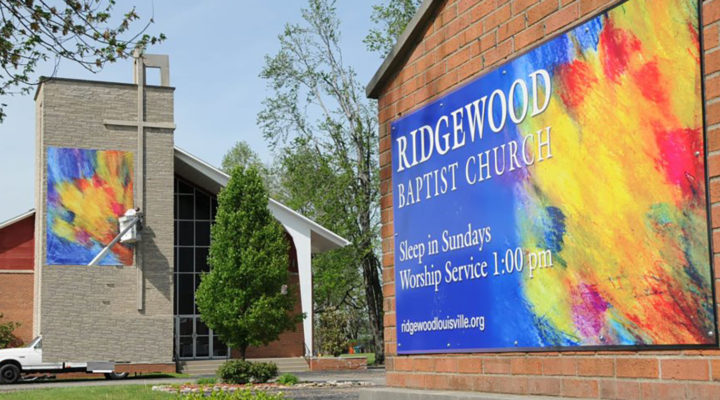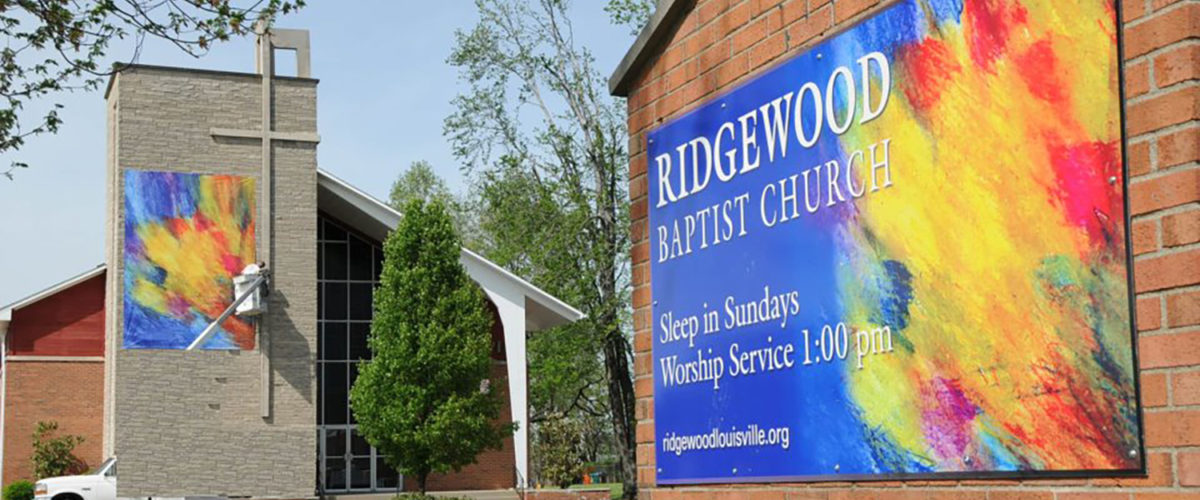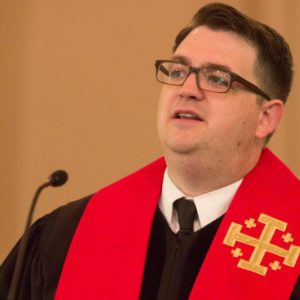National Public Radio featured a small Cooperative Baptist Fellowship church in Louisville, Ky., in a two-part series May 10 on the different ways U.S. evangelicals are responding to shifting attitudes about homosexuality and marriage in the United States.
NPR’s Morning Edition and afternoon broadcast of All Things Considered contrasted perspectives of Southern Baptist Theological Seminary President Albert Mohler, a staunch and vocal opponent of same-sex marriage and what he calls the “normalization” of homosexuality, and Ridgewood Baptist Church, a small church in a Louisville neighborhood that last month ordained an openly gay man to the ministry.
Matt Johnson, pastor of the church that started out Southern Baptist in the 1960s but now affiliates with the Decatur, Ga.,-based CBF and American Baptist Churches USA, said in a recent sermon that while growing up in conservative Southern Baptist congregation, he never had to confront issues being debated at the denominational level such as the issue of whether women can serve as preachers and pastors.
“I had never seen it,” Johnson said in his sermon April 24. “I had heard the arguments against it.”
Then late in his teens or maybe his early 20s, Johnson said while listening to a woman preach he heard the Holy Spirit speaking to him through her sermon. “If God is using her in her sermon to speak to me, if the Holy Spirit is speaking to me through her, then who am I to say that she cannot preach?” Johnson wondered.
His thinking further evolved as a student at Wake Forest Divinity School, where he met gay people “who were amazing and profoundly devoted Christians.”
“If I needed more convincing I had to say: ‘Who am I? Who am I that I could hinder God? If the Spirit is in them, what right do I have to say that it’s not?’” he said. “The Spirit told me don’t make a distinction between them and you.”
Johnson said he thinks “maybe the most meaningful and profound and important sentence in the New Testament” is found in Acts, where after witnessing the Holy Spirit fall impartially on both Jewish believers and uncircumcised Gentiles, the apostle Peter concludes, “Who was I that I could hinder God?”
Ridgewood Baptist Church describes itself “a different kind of Baptist church” on its website. “We are an open community where the doubts and questions of life are just as important as the certainties and answers. We strive to be a thinking, feeling, healing community of faith where everyone is welcome. That means everyone.”
Though still small, with an average worship attendance of 55, Ridgewood Baptist envisions itself a “21st century church,” a sharp turnaround from 2007, when after a pastor’s departure attendance dropped, offerings declined and the congregation faced an uncertain future.
In 2008 conversations began with Louisville’s Highland Baptist Church, leading to an extended partnership to enhance Ridgewood’s presence as a distinctly progressive voice of Baptist faith in southwest Jefferson County. Highland pastor Joe Phelps and associate pastor Nina Maples pulled double duty as co-pastors at Ridgewood until Steven Schafer took over as pastor in 2010.
Schafer resigned in 2013 to pursue Ph.D. studies in Europe. Johnson, who previously served at churches in Virginia and North Carolina, became pastor in October 2013, serving alongside minister of music Fred Bogert, a composer, recording artist and record producer for three Grammy-nominated albums.
NPR’s All Things Considered segment zoomed in on Ridgewood pianist Nick Wilson, a lifelong Southern Baptist who like his father, grandfather and two great grandfathers before him felt called to be a pastor but also knew from a young age that he was gay. Wilson attended Southern Seminary before giving up his plans to enter the ministry. He reunited with Ridgewood Baptist Church a couple of years ago after hearing it wasn’t like other churches that made him feel unwelcome in the past.
“Let’s create a community where everyone has a place and everyone has a voice, and maybe we might become the people that other people are talking about.”
Wilson said from the outside Ridgewood Baptist Church looks like any other Baptist church, and if driving by as a gay man he would not have been inclined to stop. “I would just assume that I already know what’s going on inside those doors, and I’m not welcome, or I don’t want to be part of it, and would go on,” he told NPR.
Last month, at age 51, Ridgewood Baptist Church at long last ordained Wilson as a minister of the gospel. His ordination certificate carried a quotation from his favorite hymn, “Just As I Am.”
Johnson said in his sermon April 24 that if Ridgewood Baptist keeps it up, they could get the kind of “bad reputation” that Jesus and Peter got for hanging around with sinners and Gentiles in the New Testament.
“Let’s create a community where everyone has a place and everyone has a voice, and maybe we might become the people that other people are talking about,” he said. “Can you believe who they let in their church? Did you see who they were hanging out with? I thought they were Christians.”
“If we’re lucky, they’ll say that about us,” he said. “If we’re lucky we can become the kind of people who have a bad reputation for following the Holy Spirit. When that happens we will know that we’ve arrived at the place where the Spirt of God is at work.”



